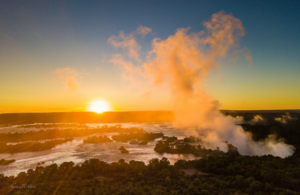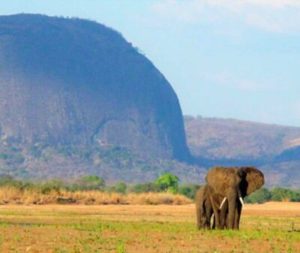
Conservation & Mental Health
Mental Health and Conservation – if we are not able to enjoy nature and all it provides we will no doubt suffer the impact of mental health.

On 31st July 2022 Nick Holme will be taking the first steps of a walking endurance event around Lake Kariba, the world’s largest man made lake by volume, situated on the Zambezi River. Anticipated to take two months to complete, the walk covers approximately 800km, through some of wild Africa’s rawest, most challenging and most beautiful terrain, in the Zambesia region of Southern Africa.
The reason for this expedition is to raise awareness about the incredible link between the natural world and mental well being and how we need to conserve what’s left of our wild areas, not just for our physical health, but for our mental health as well. The healing power of Nature is incredible – a fact that is being recognised more and more by health professionals as a viable alternative to medical interventions in treating a wide range of mental health issues. The aim behind the walk is to highlight this fact to the rest of the world and to encourage more people to reconnect with the great outdoors for their own well being.
Rungano is an experienced Corporate and Institutional Banker with over 13 years experience with Standard Chartered Bank in various roles spanning across geographies and client portfolios. Rungano is currently based in the UAE as a Director within the Financial Institutions department, covering clients domiciled within the Africa and Middle East region. He is a client coverage specialist with relationship management and credit analysis experience. He is also a frontline anti-money laundering specialist, focused on the first line AML risk monitoring, control and management.
All funds raised will go towards Zambesia Conservation Alliance (USA 501(c)(3) charity number EIN 85-1713453) and Consolidated Africa Services (Private Voluntary Organisation) (charity number PVO 37/19)
The Covid-19 pandemic has highlighted the fragility of conservation efforts throughout the world. Traditional funding through tourism has dropped dramatically and the people on the front line of conservation are suffering the consequences, with the lack of funding severely impacting the ability to maintain National Parks and Game Management Areas, as well as conduct anti-poaching patrols.
Mental health issues have been on the increase for a number of years now, with people of all ages increasingly suffering from mental health problems due to the pressures of our modern day existence. The Covid-19 pandemic has significantly magnified those problems to the extent that mental health is fast becoming an expensive, major challenge for governments around the world to deal with.
More and more scientific studies around the world are proving that, instead of relying on artificial drugs to treat many symptoms of mental illnesses, there is actually a free resource available to us that is many times more effective than chemical intervention. That resource is Nature and doctors are now starting to prescribe to patients a “dose of Nature” as a means of regaining and maintaining a mental equilibrium.
All funds raised will go towards Zambesia Conservation Alliance (USA 501(c)(3) charity number EIN 85-1713453) and Consolidated Africa Services (Private Voluntary Organisation) (charity number PVO 37/19)

Mental Health and Conservation – if we are not able to enjoy nature and all it provides we will no doubt suffer the impact of mental health.

Many of Luwire’s scouts were born and raised in Niassa. They risk their lives every day to protect free-roaming wildlife and keep the concession safe and secure for future generations of Mozambicans.

Bee Keeping to keep elephant out of fields in Africa
At a time when the world is reeling from the deepest global disruption and health crisis of a lifetime, the 2020 Living Planet Report provides unequivocal and alarming evidence that Nature is unravelling and that our planet is flashing red warning signs of vital natural systems failure. The report clearly outlines how humanity’s increasing destruction of Nature is having catastrophic impacts, not only on wildlife populations, but also on human health and all aspects of our lives.
Determinants of mental health and mental disorders include not only individual attributes such as the ability to manage one’s thoughts, emotions, behaviours and interactions with others, but also social, cultural, economic, political and environmental factors such as national policies, social protection, standards of living, working conditions and community support.
Narratives dating back two millennia and across cultures describe natural settings as places of refuge and comfort in times of psychological distress. For centuries, writers, composers, painters and poets have revered Nature and appreciated its ability to inspire awe and wonder, serenity and peace, whilst philosophers, physicians, teachers and politicians have made regular reference to its healing and restorative qualities. However, surprisingly, it is only within the past 40 years that researchers have begun to investigate the effects of spending time in, or looking at, Nature with any degree of scientific rigour.
It is now well known that positive interaction with the natural world and working with animals enhances mental well being. There have been several, well documented studies published in The Lancet and these studies prove a correlation between Nature and mental health. Zelenski and Nisbet found that Nature not only makes us happy in the moment, but causes us to feel happier in the future, when no longer in Nature.
The UK Government’s 25 Year Environmental Plan states: “Spending time in the natural environment….improves our mental health and feelings of well being. It can reduce stress, fatigue, anxiety and depression”.
Most recently, scientists have been investigating natural killer (NK) cells in the blood, which, as part of our innate immune system, attacks cells infected with a given virus and appear to increase in number after spending time in Nature (Li et al, 2006 and 2007).
We therefore need to conserve our precious natural resources, not just for the biodiversity of the world and the tourism market, but also for the good of our mental stability. Governments can save themselves billions and billions of dollars that are spent on drugs for mental health problems annually by focusing on preserving our outdoor spaces and making them accessible to all.
All funds raised will go towards Zambesia Conservation Alliance (USA 501(c)(3) charity number EIN 85-1713453) and Consolidated Africa Services (Private Voluntary Organisation) (charity number PVO 37/19)



















Currently living in the UK, Nick Holme was born and brought up in Zimbabwe and it was this upbringing that instilled in him a love for the African bush and its wildlife.
For several years now – and having been fortunate enough to experience life in both developing and developed countries – Nick has become increasingly concerned about the state the world is getting into. In particular he feels passionately about the conservation and protection of our fauna and flora for future generations to come. This passion is not simply one of the heart, but it is also based on the practical reality that the human race needs the natural world in order to exist as a species. Nature is integral to mankind’s very survival and Nick’s mantra is that “If we nurture Nature, then Nature will nurture us”. To that end he is committing himself to doing what he can to help the conservation efforts of our natural world, with a particular focus on his home territory of Southern Africa and considers himself very fortunate to be a part of the Zambesia Conservation Alliance.
Nick also feels very strongly that we do not recognise enough the healing power of Nature as an extremely effective antidote to many mental health issues that the modern world faces. This was brought into stark reality during the lockdown periods of the Covid-19 pandemic and has added greater impetus to the W4Life series of endurance events, devised by Nick and his brother, Ed, which are aimed at raising awareness about the correlation between conservation and mental well being. The initial event will be the first ever walk around the entirety of Lake Kariba, in the Zambesia region of Southern Africa and the brothers are hoping that it will be the start of a global campaign to recognise how beneficial Nature is for our mental health and how vital it is that we conserve what is left of our natural world, for both our physical and mental survival.

Rungano is an experienced Corporate and Institutional Banker with over 13 years experience with Standard Chartered Bank in various roles spanning across geographies and client portfolios. Rungano is currently based in the UAE as a Director within the Financial Institutions department, covering clients domiciled within the Africa and Middle East region. He is a client coverage specialist with relationship management and credit analysis experience. He is also a frontline anti-money laundering specialist, focused on the first line AML risk monitoring, control and management.
Rungano is passionate about community development and is currently spearheading the establishment of the Zimbabwean Business Council in the UAE whose mandate is to build a formalized network of Zimbabweans living and working in the UAE and the Middle East at large. He brings a wealth of experience in understanding predicate financial crimes to Wildlife Conservation initiatives and also his desire to seeing communities demystify mental health to the awareness campaign.
He is a holder of a Bachelor of Commerce (Hons) Degree in Banking, is a Certified Anti-Money Laundering Specialist and is also studying towards an MBA with specialization in Finance from Edinburgh Business School.